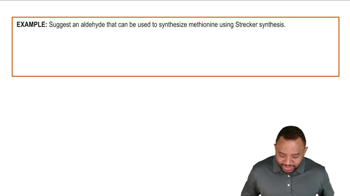Textbook Question
Show how you would synthesize the following carboxylic acids, using the indicated starting materials.
(f) allyl iodide → but-3-enoic acid

 Verified step by step guidance
Verified step by step guidance Verified video answer for a similar problem:
Verified video answer for a similar problem:



 2:12m
2:12mMaster Carbonation of Grignard Reagents with a bite sized video explanation from Johnny
Start learning